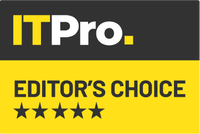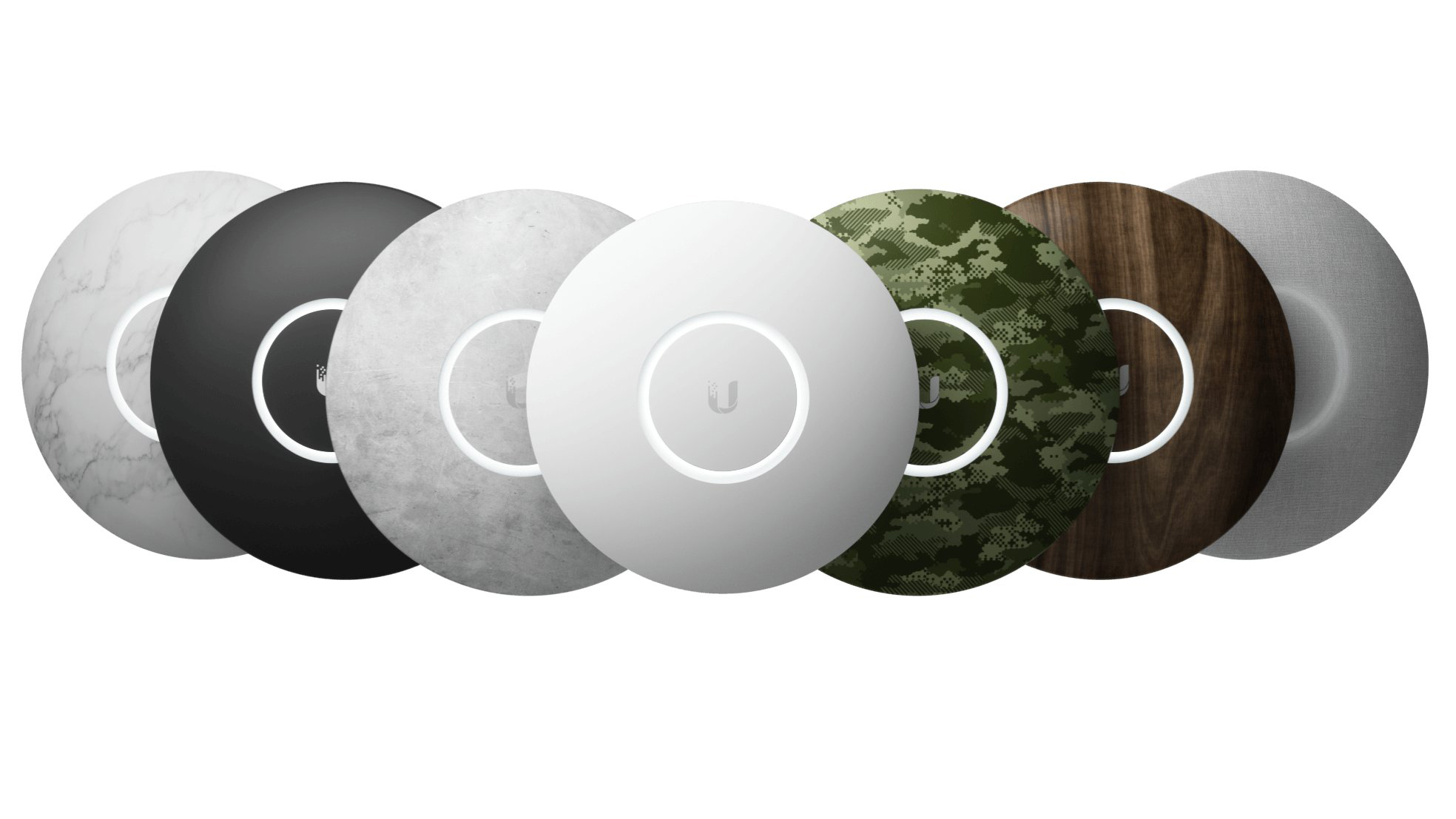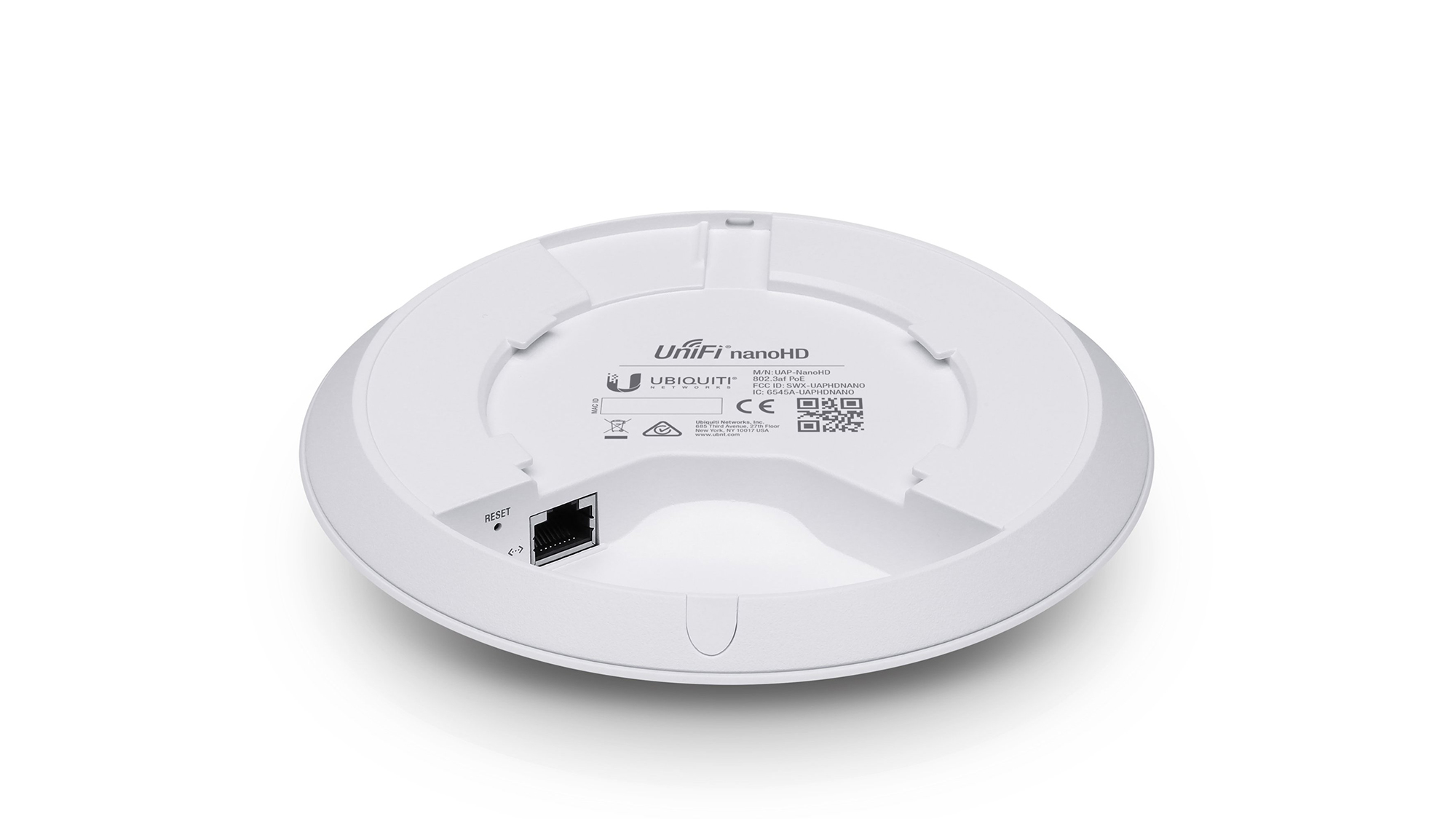Ubiquiti Networks UniFi nanoHD review: Software-defined networking on a budget
Free management, classy features, stunning wireless performance and top value – Ubiquiti’s nanoHD has it all


Ubiquiti’s clever little UniFi nanoHD is the perfect solution for SMBs looking to deploy software-defined networking whilst keeping overheads down, and investing in extra UniFi kit makes the whole package even more impressive
-
+
Great speeds and coverage; Impressive cloud-based management software; Great value
-
-
Extra hardware investment required to get the best out of it

Ubiquiti Networks is synonymous with managed wireless networks as its UniFi APs deliver an impressive range of business-class capabilities. The nanoHD is the latest to join the UniFi club and is Ubiquiti's smallest yet, tipping the scales at a mere 300g.
This Wave 2 4x4 MU-MIMO AC2100 AP has a single Gigabit port, can be powered by an 802.3af PoE source and you get a Gigabit PoE injector in the box when you buy single APs. A smart feature is the option to fit 'skins' over the front to help them blend in - we rather liked the camouflage version, with a box of three costing 41.

Ubiquiti focuses on software-defined networks (SDNs) so the nanoAP is managed using the free UniFi Network Controller (UNC) software with versions available for Windows, macOS and Linux. We installed UNC on a Windows 10 desktop in five minutes and followed the web console's quick start wizard to secure admin access, provision APs and create our first wireless network.
Cloud management is also free, so we signed up for an account and provided the local UNC host with our credentials. The cloud portal shows all distributed UNC installations, from which you can choose one and remotely launch its local web console.
As new APs are connected to the network, they appear in the UNC console and once adopted, they have their firmware upgraded to the latest version after which they present all existing SSIDs. The console's white default colour scheme can be hard on the eyes but you can switch to 'dark mode' if it's too much.
The nanoHD amazes for performance with close-range file copies from a Windows 10 desktop equipped with a Linksys WUSB6400 11ac adapter averaging 70MB/sec at close range, only dropping slightly to 65MB/sec at 10 metres. Coverage is good too, as the SweetSpots app on our iPad registered a connection dropout only when around 44 metres away and with five other offices between us and the AP.
The UNC dashboard shows all APs, connected clients and guests plus an overall client WiFi experience percentage score. Below this you can add a range of wireless performance and analysis widgets with UNC offering no less than 35 to choose from.

All wireless management is accessed from the Settings page where you add SSIDs and create guest networks. Captive portal features are extensive; you can customise the landing page as well as using the Hotspot option to implement voucher, card payment, Radius, Google, Facebook or WeChat authorisation and view the action from a separate browser window.
The captive portal requires the UNC host to be permanently available so it mustn't be allowed to hibernate. An alternative is to use Ubiquiti's little Cloud Key Gen2 appliance which runs the Linux version of UNC and is powered over PoE.
Other hardware options you'll need to consider to get the best UniFi experience are Ubiquiti's PoE switches and the UniFi Security Gateway (USG). We used a UniFi Switch 16 150W model to power our APs which was discovered and added to the UNC console where we could monitor port usage and power draw.
Adding a USG enables a lot of extra functions as the UNC console can report on gateway, provider and internet usage. Its firewall can be configured with custom rules and it also enables deep packet inspection, intrusion prevention and app usage reporting features.
You'll need to factor in the cost of extra UniFi hardware to get the most from it, but the nanoHD is perfect for SMBs looking for the best wireless performance. It's great value, a cinch to deploy and includes free on-premises and remote cloud management.
Verdict
Ubiquiti’s clever little UniFi nanoHD is the perfect solution for SMBs looking to deploy software-defined networking whilst keeping overheads down, and investing in extra UniFi kit makes the whole package even more impressive
Wave 2 AC2100 dual band 2.4GHz/5GHz 802.11ac
4x4 MU-MIMO
2 x 2.4GHz/2 x 5GHz internal aerials
Gigabit PoE/PoE+
PoE injector included
Ceiling/wall mounting plates
UNC software for Windows, macOS and Linux
160 x 160 x 33mm (WDH)
300g
1yr RTB warranty
Options
USG, £112
UniFi Switch 16 150W, £250
Cloud Key Gen2 Plus, £164 (all exc VAT)
Get the ITPro daily newsletter
Sign up today and you will receive a free copy of our Future Focus 2025 report - the leading guidance on AI, cybersecurity and other IT challenges as per 700+ senior executives
Dave is an IT consultant and freelance journalist specialising in hands-on reviews of computer networking products covering all market sectors from small businesses to enterprises. Founder of Binary Testing Ltd – the UK’s premier independent network testing laboratory - Dave has over 45 years of experience in the IT industry.
Dave has produced many thousands of in-depth business networking product reviews from his lab which have been reproduced globally. Writing for ITPro and its sister title, PC Pro, he covers all areas of business IT infrastructure, including servers, storage, network security, data protection, cloud, infrastructure and services.
-
 Westcon-Comstor and Vectra AI launch brace of new channel initiatives
Westcon-Comstor and Vectra AI launch brace of new channel initiativesNews Westcon-Comstor and Vectra AI have announced the launch of two new channel growth initiatives focused on the managed security service provider (MSSP) space and AWS Marketplace.
By Daniel Todd Published
-
 Third time lucky? Microsoft finally begins roll-out of controversial Recall feature
Third time lucky? Microsoft finally begins roll-out of controversial Recall featureNews The Windows Recall feature has been plagued by setbacks and backlash from security professionals
By Emma Woollacott Published
-
 The UK government wants quantum technology out of the lab and in the hands of enterprises
The UK government wants quantum technology out of the lab and in the hands of enterprisesNews The UK government has unveiled plans to invest £121 million in quantum computing projects in an effort to drive real-world applications and adoption rates.
By Emma Woollacott Published